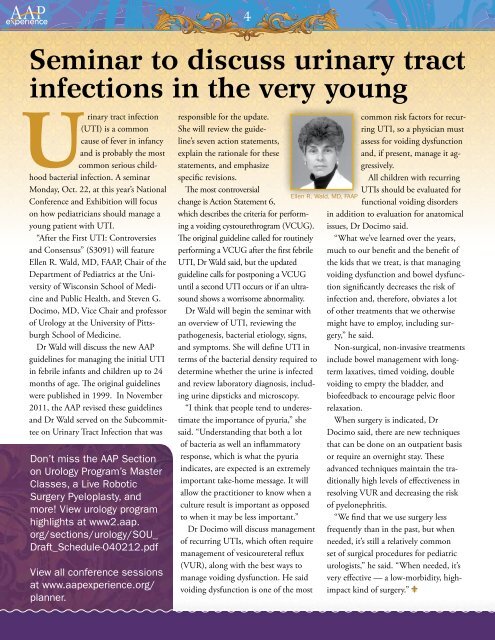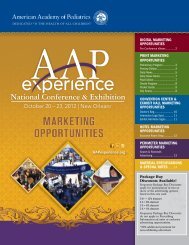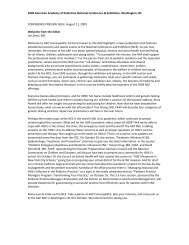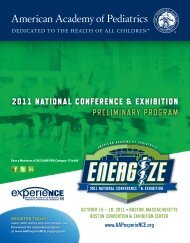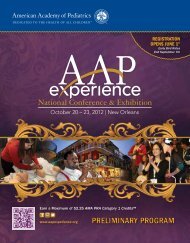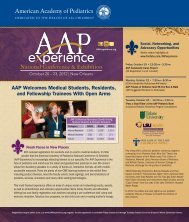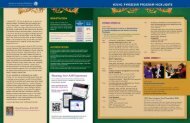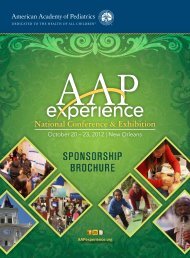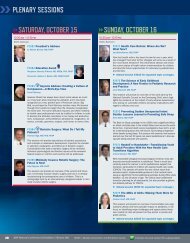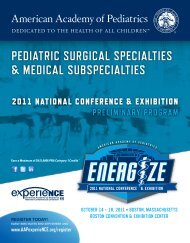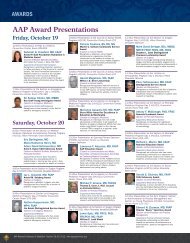Pro Bono Publico - American Academy of Pediatrics National ...
Pro Bono Publico - American Academy of Pediatrics National ...
Pro Bono Publico - American Academy of Pediatrics National ...
You also want an ePaper? Increase the reach of your titles
YUMPU automatically turns print PDFs into web optimized ePapers that Google loves.
4<br />
Seminar to discuss urinary tract<br />
infections in the very young<br />
rinary tract infection<br />
(UTI) is a common<br />
cause <strong>of</strong> fever in infancy<br />
and is probably the most<br />
common serious childhood<br />
bacterial infection. A seminar<br />
Monday, Oct. 22, at this year’s <strong>National</strong><br />
Conference and Exhibition will focus<br />
on how pediatricians should manage a<br />
young patient with UTI.<br />
“After the First UTI: Controversies<br />
and Consensus” (S3091) will feature<br />
Ellen R. Wald, MD, FAAP, Chair <strong>of</strong> the<br />
Department <strong>of</strong> <strong>Pediatrics</strong> at the University<br />
<strong>of</strong> Wisconsin School <strong>of</strong> Medicine<br />
and Public Health, and Steven G.<br />
Docimo, MD, Vice Chair and pr<strong>of</strong>essor<br />
<strong>of</strong> Urology at the University <strong>of</strong> Pittsburgh<br />
School <strong>of</strong> Medicine.<br />
Dr Wald will discuss the new AAP<br />
guidelines for managing the initial UTI<br />
in febrile infants and children up to 24<br />
months <strong>of</strong> age. The original guidelines<br />
were published in 1999. In November<br />
2011, the AAP revised these guidelines<br />
and Dr Wald served on the Subcommittee<br />
on Urinary Tract Infection that was<br />
Don’t miss the AAP Section<br />
on Urology <strong>Pro</strong>gram’s Master<br />
Classes, a Live Robotic<br />
Surgery Pyeloplasty, and<br />
more! View urology program<br />
highlights at www2.aap.<br />
org/sections/urology/SOU_<br />
Draft_Schedule-040212.pdf<br />
View all conference sessions<br />
at www.aapexperience.org/<br />
planner.<br />
responsible for the update.<br />
She will review the guideline’s<br />
seven action statements,<br />
explain the rationale for these<br />
statements, and emphasize<br />
specific revisions.<br />
The most controversial<br />
change is Action Statement 6,<br />
which describes the criteria for performing<br />
a voiding cystourethrogram (VCUG).<br />
The original guideline called for routinely<br />
performing a VCUG after the first febrile<br />
UTI, Dr Wald said, but the updated<br />
guideline calls for postponing a VCUG<br />
until a second UTI occurs or if an ultrasound<br />
shows a worrisome abnormality.<br />
Dr Wald will begin the seminar with<br />
an overview <strong>of</strong> UTI, reviewing the<br />
pathogenesis, bacterial etiology, signs,<br />
and symptoms. She will define UTI in<br />
terms <strong>of</strong> the bacterial density required to<br />
determine whether the urine is infected<br />
and review laboratory diagnosis, including<br />
urine dipsticks and microscopy.<br />
“I think that people tend to underestimate<br />
the importance <strong>of</strong> pyuria,” she<br />
said. “Understanding that both a lot<br />
<strong>of</strong> bacteria as well an inflammatory<br />
response, which is what the pyuria<br />
indicates, are expected is an extremely<br />
important take-home message. It will<br />
allow the practitioner to know when a<br />
culture result is important as opposed<br />
to when it may be less important.”<br />
Dr Docimo will discuss management<br />
<strong>of</strong> recurring UTIs, which <strong>of</strong>ten require<br />
management <strong>of</strong> vesicoureteral reflux<br />
(VUR), along with the best ways to<br />
manage voiding dysfunction. He said<br />
voiding dysfunction is one <strong>of</strong> the most<br />
Ellen R. Wald, MD, FAAP<br />
common risk factors for recurring<br />
UTI, so a physician must<br />
assess for voiding dysfunction<br />
and, if present, manage it aggressively.<br />
All children with recurring<br />
UTIs should be evaluated for<br />
functional voiding disorders<br />
in addition to evaluation for anatomical<br />
issues, Dr Docimo said.<br />
“What we’ve learned over the years,<br />
much to our benefit and the benefit <strong>of</strong><br />
the kids that we treat, is that managing<br />
voiding dysfunction and bowel dysfunction<br />
significantly decreases the risk <strong>of</strong><br />
infection and, therefore, obviates a lot<br />
<strong>of</strong> other treatments that we otherwise<br />
might have to employ, including surgery,”<br />
he said.<br />
Non-surgical, non-invasive treatments<br />
include bowel management with longterm<br />
laxatives, timed voiding, double<br />
voiding to empty the bladder, and<br />
bi<strong>of</strong>eedback to encourage pelvic floor<br />
relaxation.<br />
When surgery is indicated, Dr<br />
Docimo said, there are new techniques<br />
that can be done on an outpatient basis<br />
or require an overnight stay. These<br />
advanced techniques maintain the traditionally<br />
high levels <strong>of</strong> effectiveness in<br />
resolving VUR and decreasing the risk<br />
<strong>of</strong> pyelonephritis.<br />
“We find that we use surgery less<br />
frequently than in the past, but when<br />
needed, it’s still a relatively common<br />
set <strong>of</strong> surgical procedures for pediatric<br />
urologists,” he said. “When needed, it’s<br />
very effective — a low-morbidity, highimpact<br />
kind <strong>of</strong> surgery.”


